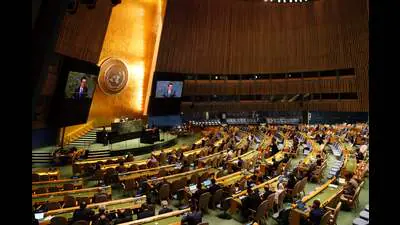G20 Summit: India officially inaugurated the Global Biofuels Alliance on Saturday, and Prime Minister Narendra Modi pleaded with the G20 to support the project by pushing for a global 20% ethanol blend in petrol. Along with a number of other world leaders, including US President Joe Biden, Brazilian President Luiz Inacio Lula da Silva, Bangladesh Prime Minister Sheikh Hasina, and Italian Prime Minister Giorgia Meloni, PM Modi established the Alliance on the margins of the G20 Summit.
Founding Members of the Global Biofuels Alliance
Argentina, Bangladesh, Brazil, Italy, Mauritius, South Africa, the United Arab Emirates, and the United States were among the starting members in addition to India, while Canada and Singapore are observer nations. Earlier, Prime Minister Modi asked leaders to start working on the “Green Credit Initiative” during his remarks at the G20 Summit session on “One Earth.” He also suggested creating the “G20 Satellite Mission for Environment and Climate Observation.”
Global Collaboration on Fuel Blending
“Today, the need of the hour is that all countries should work together in the field of fuel blending. Our proposal is to take an initiative at a global-level to take ethanol blending in petrol up to 20 per cent,” he said. “Or alternatively, we could work on developing another blending mix for the greater global good, one that ensures a stable energy supply while also contributing to climate security,” PM Modi said at the session attended by US President Biden, Saudi Arabia Crown Prince Mohammed bin Salman, and UK Prime Minister Rishi Sunak among others.
Climate Change Imperative
According to Prime Minister Modi, the threat of climate change makes energy transformation a crucial need of the 21st century. He claimed that developed countries play a very important role in this and that trillions of dollars are needed for an equitable energy transformation. “Along with India, all the countries of the Global South are pleased that developed countries have taken a positive initiative this year, in 2023. Developed countries have expressed their willingness to fulfil their commitment of USD 100 billion for climate finance for the first time,” he said. “Biofuels are also important from the perspective of a circular economy. Markets, trade, technology, and policy all aspects of international cooperation are crucial in creating such opportunities,” PM Modi had said.
Broken Promises on Climate Finance
Developed nations pledged to provide USD 100 billion annually by 2020 to assist developing nations in battling climate change at the UN climate negotiations in Copenhagen in 2009. But the wealthier countries consistently fell short of keeping this promise. The International Solar Alliance (ISA), which was launched by New Delhi and Paris in 2015 to make clean and inexpensive solar energy accessible to everyone, is a model for the Global Biofuels Alliance, which the third-largest oil user in the world aims to promote during its G20 presidency. In an exclusive interview with PTI earlier this month, Prime Minister Modi said that India’s proposal for a global alliance on biofuels among members of the Group of 20 major countries will aid in accelerating the deployment of sustainable biofuels in support of the world’s energy transition. Biomass is a sustainable energy source that is used to create biofuel. India, which imports more than 85% of its crude oil requirements, is progressively increasing its capacity to create fuel from waste materials like municipal solid waste, plant waste, and crop stubble. India is building dozens of compressed biogas (CBG) plants while also on target to quadruple the amount of ethanol made from sugarcane and agricultural waste that is mixed with petrol to 20% by 2025. The mission of the Global Biofuels Alliance is to promote collaboration and increase the use of sustainable biofuels in all industries, particularly transportation.
Global Biofuels Alliance’s Ambitious Objectives
Its main goals are to expand markets, promote international commerce in biofuels, create practical policy lesson exchanges, and offer technical assistance to national biofuel projects around the world. In addition to assisting India’s transition to alternative fuels and reducing its import costs, such a project is intended to help the country reach its target of net zero carbon emissions by 2070. The ISA, on the other hand, aspires to mobilise the over $1 trillion in investment that would be required by 2030 for the extensive deployment of solar energy. According to the International Energy Agency (IEA), in order to put the world’s energy system on pace for net-zero emissions by 2050, worldwide sustainable biofuel output must triple by 2030. In 2022, liquid biofuels accounted for more than 4% of all transport energy.
Keep watching our YouTube Channel ‘DNP INDIA’. Also, please subscribe and follow us on FACEBOOK, INSTAGRAM, and TWITTER.












